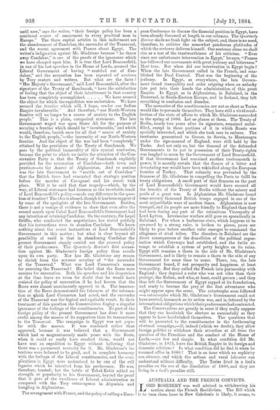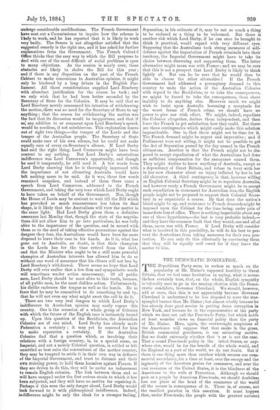AUSTRALIA AND THE FRENCH CONVICTS.
T4ORD ROSEBERY was well advised in withdrawing his I motion about the French Recidivists. The Bill which is to turn them loose in New Caledonia is likely, it seems, to
undergo considerable modifications. The French Government have sent out a Commissioner to inquire how the scheme is likely to work, and he has reported that it is likely to work very badly. The Senate is not altogether satisfied that the suggested remedy is the right one, and it has asked for further explanations from the Government. The French Colonial Office thinks that the easy way in which the Bill proposes to deal with one of the most difficult of social problems is open to many objections. As the session is nearly over, these obstacles are likely to shelve the Bill for this year ; and if there is any disposition on the part of the French Cabinet to make concessions to Australian opinion, it might only be hindered by a long debate in the English Par- liament. All these considerations supplied Lord Rosebery with abundant justification for the course he took ; and we only wish that he had been better seconded by the Secretary of State for the Colonies. It may be said that as Lord Rosebery merely announced his intention of withdrawing the motion, there was no need for the Secretary of State to say anything ; that the reason for withdrawing the motion was the fact that its discussion would be inopportune, and that if so; any addition to or comment upon Lord Rosebery's speech would be needless, if not mischievous. This explanation leaves out of sight two things,—the temper of the Lords and the temper of the Australian people. The Secretary of State could make sure of his own silence, but he could not make equally sure of every ex-Secretary's silence. If Lord Derby had said the right thing, Lord Carnarvon might have been content to say nothing. But Lord Derby's ostentatious indifference was Lord Carnarvon's opportunity, and though he used it temperately, he still used it. A few words from Lord Derby showing that he is thoroughly impressed with the importance of not alienating Australia would have left nothing more to be said. As it was,' these few words remained unspoken, and instead of them there came a speech from Lord Carnarvon, addressed to the French Government, and taking the very tone which Lord Derby ought to have taken on behalf of the Government. Nor, though the House of Lords may be content to wait till the Bill which has provoked so much remonstrance has taken its final shape, is it likely that the Australians will view the matter in the same light. Had Lord Derby given them a definitive assurance last Monday that, though the state of the negotia- tions did not allow him to go into particulars, he was fully alive to the importance of the question, and in accord with them as to the need of taking effective precautions against the dangers they fear, the-Australians would have been far more disposed to leave their case in his hands. As it is, what has gone out to Australia, no doubt, is that their champion in the Lords has for the time retired from the field, and that the Minister who ought to be a still more powerful champion of Australian interests has allowed him to do so without one word of assurance that his clients will not lose by Lord Rosebery's withdrawal. There seems no hope that Lord Derby will ever realise that a few firm and sympathetic words will sometimes render action unnecessary. Of all public men, Lord Derby should be most alive to this truth, because, of all public men, he the most dislikes action. Unfortunately, his dislike embraces the tongue as well as the hands. He so fears that ho may be committed to do something by and by, that he will not even say what might avert the call to do it.
There are two very real dangers to which Lord Derby's indifference to Australian opinion may easily expose this country. One is the secession of a whole group of Colonies with which the future of the English race is intimately bound up. Upon this question of the Recidivists, the Australian Colonies are of one mind. Lord Derby has already made Federation a certainty ; it may yet be reserved for him to make separation a certainty. If the Australian Colonies find that a question which, as involving their relations with a foreign country, is, in a special sense, an Imperial, and not a merely Colonial question, is settled or left unsettled as best suits the convenience of the mother country, they may be tempted to settle it in their own way in defiance of the Imperial Government, and trust to distance and their own resisting power, to hold them harmless against France, If they are driven to do this, they will be under no inducement to remain English colonies. The link between them and us will have snapped under the first serious strain to which it has been subjected, and they will have no motive for repairing it. Perhaps if this were the only danger ahead, Lord Derby would look forward to it with philosophical indifference. Indeed, indifference might be only the cloak for a stronger feeling,
Separation, in his estimate of it, may be not so much a thing to be endured as a thing to be welcomed. But there is another risk which Lord Derby, if he can once be brought to think it practical, would regard with very different eyes. Supposing that the Australians took strong measures of self- defence against the importation of French criminals into their territory, the Imperial Government might have to take its choice between disowning and supporting them. The latter alternative might mean war with France; and we may be sure that this is not a prospect that Lord Derby is likely to think lightly of. But can he be sure that he would then be able to choose the other alternative ? If the French Government had addressed a peremptory demand to this country to undo the action of the Australian Colonies with regard to the Recidivists, or to take the consequences, we might be forced to take the consequences, from sheer inability to do anything else. However much we might wish to insist upon Australia becoming a receptacle for the worst forms of French crime, we should have no power to give our wish effect. We might, indeed, repudiate the Colonies altogether, declare them independent, and then leave the French to get satisfaction how they could. But there are three contingencies which might easily make this solution impracticable. One is, that there might not be time for it. The French demand might be urgent and imperative ; and if Parliament were not sitting, it might not be possible to get the Act of Separation passed by the day named in the French ultimatum. Another is that the French might not be dis- posed to accept repudiation of what the Australians had done as sufficient compensation for the annoyance caused them. They might decline to know anything of Australia, except as a dependency of Great Britain, and refuse to treat with her in her new character about an injury inflicted by her in her old character. A third contingency is that, however willing an English Colonial Secretary might be to repudiate Australia, and however ready a French Government might be to accept such repudiation in atonement for Australian sins, the English people might not be prepared to support their Colonial Secre- tary in so unpatriotic a course. By that time the nation's blood might be up, and resistance to French demands might be imposed upon the Cabinet for the time being, under pain of immediate loss of office. There is nothing improbable about any one of these hypotheses,—the last is very probable indeed,— and they have the common fault that they would, one and all of them, mean war with France. If Lord Derby will consider what is involved in this possibility, he will do his best to pre- vent the Australians from taking measures for their own pro- tection. He can only do this effectually by convincing them that they will be equally well cared for if they leave the matter to him.



































 Previous page
Previous page